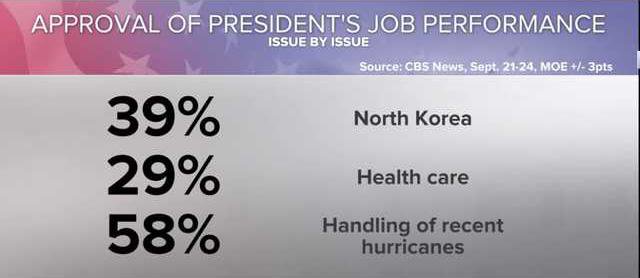A majority of Americans are spooked by the government.
The annual Chapman University Survey of American Fears reviewed what Americans fear most in 2017, and leading the way with 74 percent was the corruption of government officials.
American health care/Trumpcare finished second on the list (55 percent), while pollution of oceans and lakes (53 percent) finished third, pollution of drinking water was fourth (50 percent) and not having enough money finished fifth (also 50 percent).
Other top fears included: high medical bills; a potential third World War; global warming and climate change; North Korea using nuclear weapons; and air pollution.
The survey sampled 1,207 adults from across the United States about 80 different fears, including crime, the government, the environment, personal anxieties and many others. The rankings were based on the percentage of adults who voted items as their top fear.
What is, perhaps, most striking about American fear in 2017 is that environmental fears, including water pollution and drinking water quality, figure more prominently than ever before, according to Chapman University's press release on the survey. Environmental issues never cracked the top ten fears in our previous surveys.
Researcher Edward Day said the study also found that fear is on the rise.
This year we saw some big changes. Fear has really gone up, Day said. Prior to this year, there was only one item where the majority of Americans said they were afraid or very afraid, and this year there were five.
The 2017 list varies from the same research in 2016. Though the top fear (corrupt government) was the same, terrorist attack was No. 2 with 41 percent of the vote.
Not having enough money was third (39.9 percent) and overall "terrorism" finished fourth (38.5 percent).
Day added that people arent as afraid of crime-related events as much as in the past, either.
Now, people fear corruption of the government and the White House, CBS reported.
Our previous lists had more to do with disasters and crime, and that naturally lent itself to the type of messaging (about crime) were doing, researcher Christopher Bader said, according to Smithsonian magazine. The list this year is fundamentally different in the sense that its showing a great fear of some of the things happening in this presidency.
Bader said the survey showed one positive change for culture, though.
Clowns and zombies are both down, he said.
But, he added, "the survey was done before (the movie) 'It' was released.
The annual Chapman University Survey of American Fears reviewed what Americans fear most in 2017, and leading the way with 74 percent was the corruption of government officials.
American health care/Trumpcare finished second on the list (55 percent), while pollution of oceans and lakes (53 percent) finished third, pollution of drinking water was fourth (50 percent) and not having enough money finished fifth (also 50 percent).
Other top fears included: high medical bills; a potential third World War; global warming and climate change; North Korea using nuclear weapons; and air pollution.
The survey sampled 1,207 adults from across the United States about 80 different fears, including crime, the government, the environment, personal anxieties and many others. The rankings were based on the percentage of adults who voted items as their top fear.
What is, perhaps, most striking about American fear in 2017 is that environmental fears, including water pollution and drinking water quality, figure more prominently than ever before, according to Chapman University's press release on the survey. Environmental issues never cracked the top ten fears in our previous surveys.
Researcher Edward Day said the study also found that fear is on the rise.
This year we saw some big changes. Fear has really gone up, Day said. Prior to this year, there was only one item where the majority of Americans said they were afraid or very afraid, and this year there were five.
The 2017 list varies from the same research in 2016. Though the top fear (corrupt government) was the same, terrorist attack was No. 2 with 41 percent of the vote.
Not having enough money was third (39.9 percent) and overall "terrorism" finished fourth (38.5 percent).
Day added that people arent as afraid of crime-related events as much as in the past, either.
Now, people fear corruption of the government and the White House, CBS reported.
Our previous lists had more to do with disasters and crime, and that naturally lent itself to the type of messaging (about crime) were doing, researcher Christopher Bader said, according to Smithsonian magazine. The list this year is fundamentally different in the sense that its showing a great fear of some of the things happening in this presidency.
Bader said the survey showed one positive change for culture, though.
Clowns and zombies are both down, he said.
But, he added, "the survey was done before (the movie) 'It' was released.








